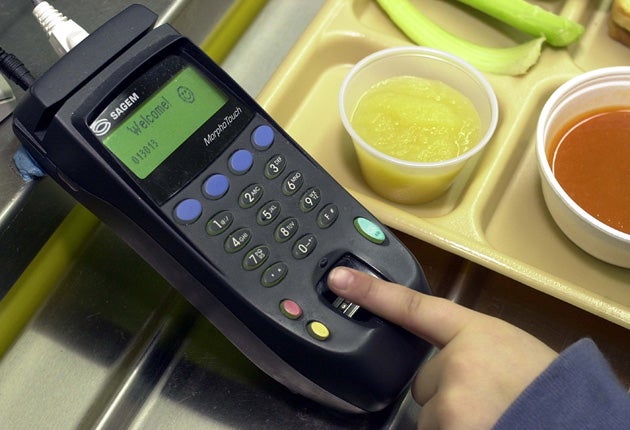Fingerprint system 'stigmatises pupils'
Protests after children are scanned without the consent of their parents

Your support helps us to tell the story
From reproductive rights to climate change to Big Tech, The Independent is on the ground when the story is developing. Whether it's investigating the financials of Elon Musk's pro-Trump PAC or producing our latest documentary, 'The A Word', which shines a light on the American women fighting for reproductive rights, we know how important it is to parse out the facts from the messaging.
At such a critical moment in US history, we need reporters on the ground. Your donation allows us to keep sending journalists to speak to both sides of the story.
The Independent is trusted by Americans across the entire political spectrum. And unlike many other quality news outlets, we choose not to lock Americans out of our reporting and analysis with paywalls. We believe quality journalism should be available to everyone, paid for by those who can afford it.
Your support makes all the difference.Schools are denying pupils their civil liberties by fingerprinting them without seeking the consent of their parents, teachers warned yesterday.
Around 80 secondary schools have introduced a new method of scanning the thumbs of pupils as part of a biometric system to replace swipe cards for registration, library book borrowing and cashless catering for school meals. The use of fingerprinting comes despite fears – acknowledged by the Information Commissioners' Office – that some parents believe the practice leads to children being "treated like criminals".
The schools argue that it is a more effective way, in particular, of registering for school meals than the use of identification cards, which can be lost or stolen. However, parents at the Capital City Academy in Brent, north-west London, reacted furiously when the scheme was introduced one lunchtime without consultation at their children's school.
Hank Roberts, a delegate from Brent, told the Association of Teachers and Lecturers' annual conference in Liverpool yesterday: "Apparently, the law indicates that it is not necessary to have parents' or guardians' permission to have their children's fingerprints."
In guidance, the Information Commissioner's Office states: "There is nothing explicit in the [Data Protection] Act to require schools to seek consent from all parents before implementing a fingerprinting application.
"However, unless schools can be certain that all children understand the implications of giving their fingerprints, they must fully involve parents in order to ensure that the information is obtained fairly."
It added that "any use of biometric technologies outside law enforcement" should bear in mind the perception that it stigmatised those having their fingerprints taken.
Mr Roberts added: "The important thing is the question of parental consent. If you want to have your kids' fingerprints taken without your consent, I think that is wrong.
"It is multiplying. Parental consent should be compulsory. It is outrageous that fingerprints can be taken without parents' and guardians' consent."
However, Geoff Pye, from Essex, said: "It is schools using it – it is not the police. There are a lot of parents who like it – there is no problem with dinner money. This is not an Orwellian nightmare. It is a very useful tool."
Following the complaints from parents, Capital City Academy, one of the Government's first flagship academies, introduced an "opt-out" clause for pupils. Those who refused to be fingerprinted were given a four-digit code number instead.
The school wiped out the details it had collected from pupils prior to the complaints.
In a letter to parents, it added: "Having used identification cards for the past six years, we have found this has become ineffective and feel there are significant advantages to upgrading the system to make it more personalised." It said the thumb scan was converted into a four-digit pin code and could not be converted into a fingerprint.
The union has set up a working party to draw up a policy on the use of biometric systems "as a matter of urgency".
Join our commenting forum
Join thought-provoking conversations, follow other Independent readers and see their replies
0Comments